3-Day Gut Reset Meal Plan (From a Nutritionist)
Many of us suffer from digestive system issues or want to work on our digestive health. Here’s a 3-day Gut Reset Plan including what to eat and what to avoid.
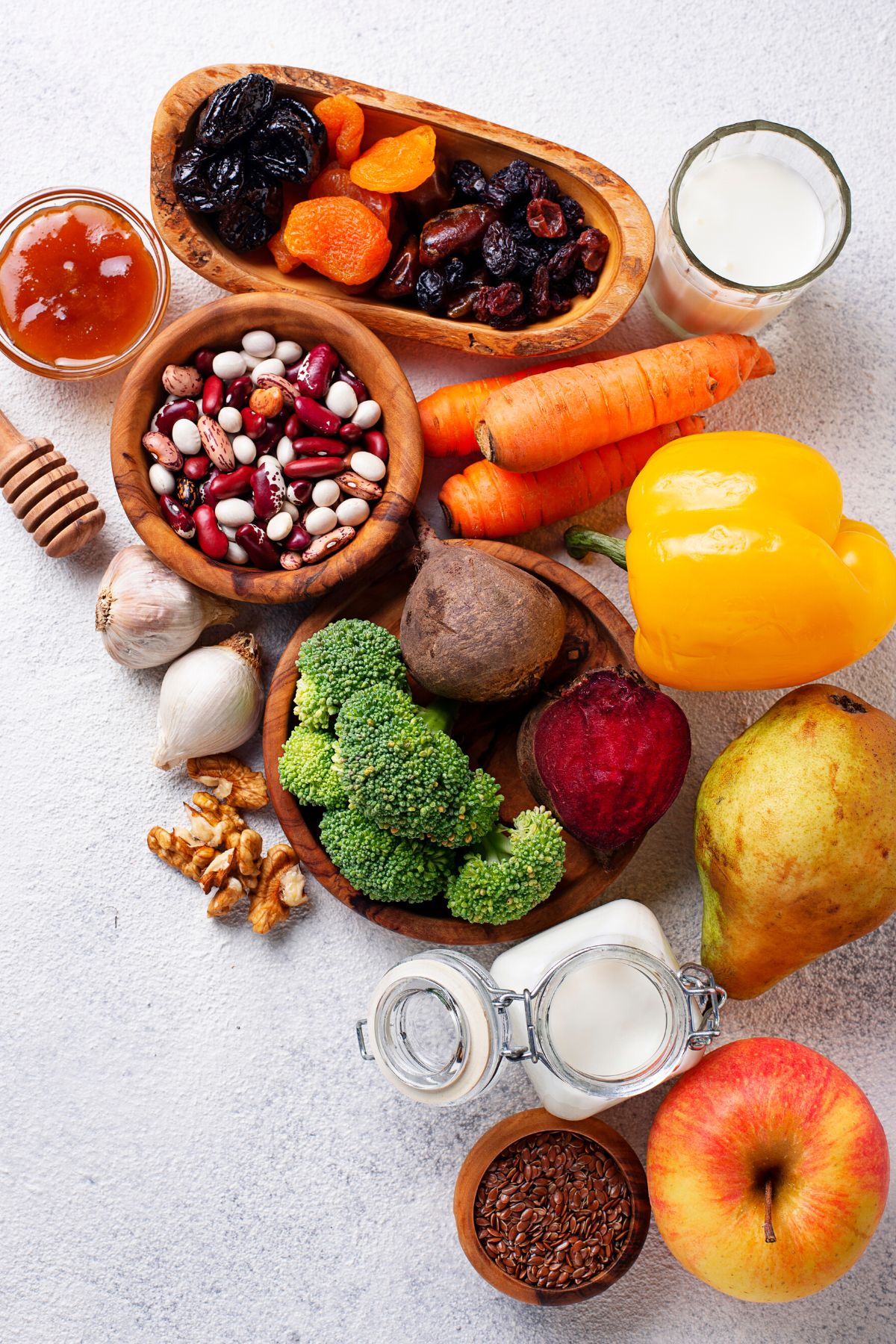
3 Day Gut Reset Diet
If you are new to a clean eating approach, then you might find this 3-Day Gut Reset Plan helpful.
Remember that the goal is to choose easy to digest foods that are made without a lot of processed ingredients, artificial flavors, or preservatives. Choose whole foods that will contribute to a healthy diet and improve your overall health.
This sample 3-day Leaky Gut Diet is gluten-free, dairy-free, with no added sugars. Feel free to make adaptions based on your individual needs.
You should not feel hungry, so be sure to add snacks or side dishes to make sure you get enough calories.
And, as always, please consult your healthcare provider before making any changes to your diet.
Day One
Breakfast: Chocolate Smoothie Bowl
Lunch: Turkey Meatloaf Muffins or Instant Pot Salmon and Rice
Dinner: Sweet Potato Shepherd’s Pie
Snacks or Dessert: Vitamix Mango Sorbet
Day Two
Breakfast: Coconut Milk Pancakes or Instant Pot Buckwheat Porridge
Lunch: Keto Chicken Fajitas or Dairy-Free Potato Soup
Dinner: Chicken Meatloaf
Snacks: Whole30 Chia Pudding or Instant Pot Baked Apples
Day Three
Breakfast: Sweet Potato Apple Breakfast Hash
Lunch: Instant Pot No-Bean Turkey Chili or Slow Cooker Green Chile Chicken
Dinner: Chicken Broccoli Rice Casserole
Snacks: Banana Peach Smoothie
Symptoms of Gut Issues
Some of the signs and symptoms of gut issues may include:
- Digestive problems such as bloating, abdominal pain, and diarrhea
- The presence of autoimmune disease
- Food allergies and food sensitivities
- Inflammatory skin conditions such as acne, psoriasis, and dermatitis
- The symptoms of osteoarthritis including joint pain
- Depression and other mental health issues
- Fatigue and brain fog
- Headaches/migraines
Foods to Avoid
1. Milk and butter
Sensitivity to cow’s milk is very common and conventional cow’s dairy products may aggravate leaky gut syndrome.
You could, however, try other types of milk, such as sheep or goat’s milk. You might find that you can tolerate these better because the casein they contain generally causes less inflammation than the casein in cow’s milk.
You could also try fermented cow’s milk products like yogurt and kefir, which are believed to have a healing effect on the gut.
Instead of butter made with cow’s milk, try clarified butter or ghee, which is less likely to trigger a reaction.
Read my full article on the reasons to go dairy-free.
2. Grains and products containing gluten
Wheat, rye, barley, and spelt all contain a protein called gluten. Studies have shown that gluten can increase zonulin levels in some people. This, in turn, can increase intestinal permeability.
It is best to totally avoid gluten if you suffer from leaky gut syndrome, which means also cutting out all the products containing it. These can include many cereals, breads, pasta, and crackers.
Fortunately, there are lots of gluten-free products around these days to make it easier to avoid. If you are keen to continue consuming whole grains, then try soaking or sprouting them before eating, which helps break the gluten down to make it more digestible.
See my article that goes into more detail about going gluten-free and why you might want to try it. You may also like my article on the potential benefits of a grain-free diet for humans.
3. Sugar
Studies suggest that too much fructose – a fruit sugar that also makes up 50% of table sugar – can have a negative impact on intestinal permeability.
On a leaky gut diet, it is best to cut back on the amount of refined white sugar you consume, along with other sweeteners like honey, agave, and natural sugars like maple syrup and cane juice.
Remember, too, that sugar helps to feed the yeast and “bad” bacteria in your gut, which may be triggering your leaky gut syndrome in the first place. Even artificial sweeteners need to be used in moderation, as studies have shown that saccharin can upset the gut’s natural balance of bacteria.
It’s also important to limit the number of processed or junk foods that you eat, as these often contain lots of sugar and tend to be high in inflammatory ingredients that will make your symptoms worse.
See my sugar-free diet plan.
Foods to Include on a Gut Reset Diet
Your best bet on a gut reset diet is to include lots of whole, real foods without a lot of artificial ingredients or preservatives.
You may need to cook your fruits and vegetables to help make them easier to digest. Once you have a healthy gut, you can try re-introducing more and more foods and observing how you feel.
Consider keeping a symptom journal of the foods you eat and how you feel afterwards. You should not have stomach pain or other unpleasant symptoms, otherwise you may have a sensitivity to that food.
Be sure to include lots of the gut healing foods and gut health herbs as well as the following list.
1. Fruits and vegetables
Fruits and vegetables are good sources of fiber and also supply you with prebiotics – the type of fiber that feeds the “good” bacteria in your gut.
Be sure to include root vegetables and tubers, such as carrots and potatoes, as these also provide slow-burning carbohydrates.
And, if you don’t feel like you can digest the fiber from fruits and veggies very well, try consuming them in smoothie form! I love this Gut Health Smoothie that is full of healthy ingredients.
2. Fermented vegetables
Try to eat a daily source of fermented veggies such as kimchi or sauerkraut.
These are rich in probiotic bacteria and help keep your gut healthy.
3. Gluten-free whole grains and seeds
Consider gluten-free “pseudo grains” including quinoa, millet, rice, oats, buckwheat, amaranth, and teff. Use these in place of gluten-containing grains.
In addition to supplying you with slow-burning carbohydrates, they are also great sources of minerals and fiber.
See my list of the best gluten-free carbohydrates.
4. Cultured dairy products
While you may need to avoid cow’s milk, you may be able to include cultured goat or sheep products.
These include natural yogurt, kefir, some cheeses, and cultured buttermilk, all of which can help replenish the good bacteria in your gut.
5. Bone broth
Homemade or quality boxed bone broth contains collagen plus a range of useful amino acids including glutamine, which studies have shown can help heal the gut.
Homemade broth is preferable to the commercial variety, which can sometimes contain added ingredients that make the symptoms of leaky gut syndrome worse.
6. Healthy fats
Try to include healthy fats with all of your meals and snacks including olive oil, coconut oil (unrefined and cold-pressed), fish oil, and avocado oil.
These can help improve your digestion, reduce inflammation and provide food for some of the “friendly” bacteria in the gut.
7. Turmeric
Turmeric contains the natural anti-inflammatory compound curcumin, which has been demonstrated to reduce inflammation in the lining of the gut.
You can add it to all sorts of things, from your daily smoothie to scrambled eggs. Or, try my simple Turmeric Shot that you can take daily.
Lifestyle Changes
In addition to the Leaky Gut Diet and supplements recommended above, you may also try these lifestyle changes.
- Exercise on a regular basis
- Make sure that you get enough sleep each night (ideally 8 to 9 hours)
- Give up smoking
- Chew your food thoroughly at mealtimes
- Avoid taking antibiotics unnecessarily
- Take steps to reduce stress – try calming activities like yoga, deep breathing, mindfulness, and meditation
More Holistic Health Articles You Might Like
Don’t forget to join my newsletter list to get exclusive clean eating recipes and tips. The newsletter is 100% free with no spam; unsubscribe anytime.
About the Author: Carrie Forrest has a master’s degree in public health with a specialty in nutrition and is a certified holistic nutritionist. She is a top wellness and food blogger with over 5 million annual visitors to her site. Carrie has an incredible story of recovery from chronic illness and is passionate about helping other women transform their health. Send her a message through her contact form.
Note: this post is for informational purposes only and is not intended as medical advice. Please consult your healthcare provider for recommendations related to your individual situation.


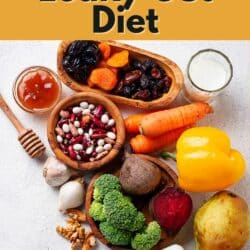
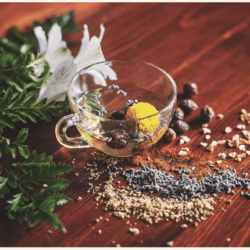

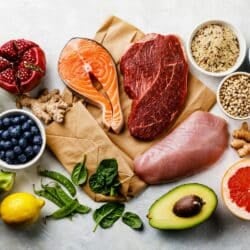



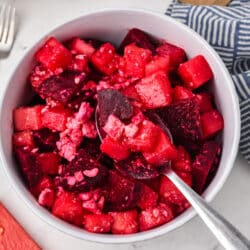
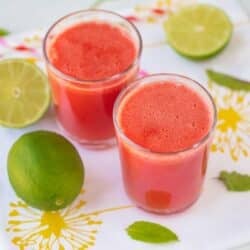
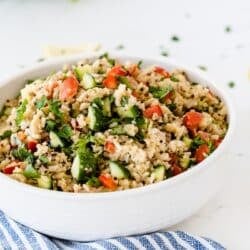









Thanks, these are very useful and natural drug free ways to improve gut health. It’s always best to try natural solutions as modern medicine seems to overlook safer and economical ways to combat illnesses. Cheers!